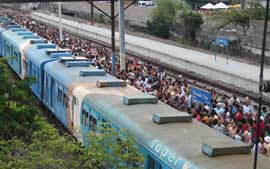As part of our Hip Deep programming, we sent Afropop producer Marlon Bishop to Rio De Janeiro to produce a two-part radio documentary series about the history of samba in Brazil’s iconic city by the bay. Read about his experiences doing research for the program here on the blog.
Each year around the “National Day of Samba” on December 2, Rio throws one of the coolest parties on planet Earth. For one day, the commuter rail system that connects the sprawling, low-income suburbs of the city’s North Zone to downtown Rio is taken over and becomes the Trem do Samba (Samba Train).
Throughout the day, trains leave from the gritty Central Station downtown, each packed with representatives from a different samba roda, or jam session, from around town – so you might have the old timers from the Salgueiro samba school or young kids from a weekly Copacabana session. Each train is also filled to the brim with revelers who stand on the seats, swing on the hand-rails, drink copious amounts of beer, and sing like it’s the last train they’ll ever ride on. The train hurdles at top speed, throwing people into each other and skipping all the stops until it arrives at the end of the line, the neighborhood of Osvaldo Cruz. Here’s some video I took from the train:
Osvaldo Cruz is a working class neighborhood near to the famous Portela favela, home to one of the city’s oldest and most beloved samba schools, as well as legendary composers like Monarco and Paulo da Portela. As samba fans pour out of the trains from downtown, they arrive at an old-school street party along a residential strip in the neighborhood. At every turn, there’s another acoustic roda booming away, each with a large crew standing around the table and singing along and seeming to know all the words, as always.
The whole experience is a total blast, and struck me as really improbable. The event receives funding from Petrobras (the national oil company) and Supervia, (the transit authority that runs the commuter rail) yet there’s no attempt to present samba with the glossy, slicked-up treatment it often receives. Whereas other big music events in Rio, such as the Rock in Rio festival, are generally situated on the city’s postcard-ready beaches, the Trem Do Samba festival unfolds along a stretch surrounded by humble homes and public housing projects. The event is designed to emphasize samba’s working-class roots and to show love to the oft-forgotten favela composers who gave samba its poetry.
But it’s other affect is to bring samba fans from Rio’s more well-heeled to a part of town they might never otherwise step foot in. Rio is a famously divided city – it’s elite South Zone worlds away in terms of wealth and development from the poorer North Zone. As we explore in “Samba at the Dawn of Modern Brazil,” samba was promoted as national culture in a way that gave wealthy Brazilians access to Afro-Brazilian culture, but never quite gave poorer Brazilians access to real opportunity or social mobility. But for one day a year, as the samba train hurtles northwards, the North Zone gets a day to show off what it can do, a day to say, “you’re all invited to the party but take note: Samba still belongs to us.”









